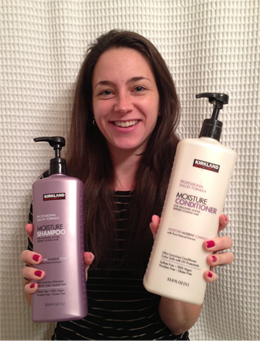I’ve been reading a number of discussions recently about whether gluten free products such as shampoos, conditioners, makeup, lotions, etc. are necessary. Apparently, it is highly debated. Plenty of people say that they aren’t necessary, claiming it’s all a bunch of hype that drags gullible people in and much more, but I disagree. Keeping in mind that I am gluten sensitive (not celiac), I do understand the argument that people aren’t eating these products so it can’t harm, however, I see harm in this case as subjective.

Kirkland Gluten Free Shampoo and Conditioner, December 2013
If a piece of gum can trigger someone nearly immediately, why couldn’t it be enough for someone who accidentally got shampoo in their mouth while rinsing to be glutened too? I don’t see why that is hard to believe. And your skin absorbs substances, so why isn’t some kind of reaction possible? Until recently, I thought that gf shampoo and conditioner was completely unnecessary. I didn’t use them and saw no reason to, but an incident made me second guess myself. Obviously, I’m not speaking of the same kind of reaction I normally have or the type of damage that would be done to a celiac ingesting it, but I do seem to have an issue with it. It is possible that you are here because you do too.
For about a month, I was wondering why my neck was itching so badly some days and suddenly it all came together. When I put the TIGI Bead Head Control Freak Conditioner in my hair that morning, a glob slid down my neck and immediately I started to itch. It clicked. I flipped over the bottle and sure enough, wheat and more wheat in the ingredients (specifically hydrolyzed wheat protein and hydrolyzed wheat starch). Seriously?! Because I didn’t think using gf hair products was necessary, I hadn’t even considered that it was my problem! I washed it out, pitched the rest of the bottle and hit the internet.
I was leaving for Disney the following day and wanted to have this semi-sorted out before I left, so I did a quick search. I wanted to know about circumstances that caused people to start using them, as well as what brands were deemed okay. I learned a lot and I learned that I wasn’t alone. In particular, one article at WeAreGlutenFree by Andrew Cordova struck me. He had tested a variety of products for gluten. He ditched his former choices, only to find a pleasant reprieve from his customary dandruff and wasn’t looking back. He opted for Kirkland’s gluten free shampoo and conditioner from Costco now. Seemed easy enough to me, so I popped over to pick some up and give them a try. I was excited to see that they were clearly labeled gf! I had never seen that on a hair product before!
Long story short, I haven’t been scratching the heck out of my neck since and like Andrew, my dandruff has become minimal. Overall, I’m not looking back either. If any part of my story sounds familiar, I’d encourage you to take a look at your hair products or cosmetics, especially if you recently switched brands, to see if any ingredients jump out at you. Don’t always expect to see the obvious “wheat” like I did.
This is not a complete list of every possible ingredient but a solid collection of terms.
- Triticum vulgare (wheat)
- Hordeum vulgare (barley)
- Secale cereale (rye)
- Avena sativa (oats)
- Barley extract
- Barley lipids
- Disodium wheat germamido peg-2 sulfosuccinat
- Fermented grain extract
- Oat
- Oat bran extract
- Oat bran
- Oat flour
- Oat protein
- Wheat germ oil
- Wheat germ extract
- Wheat germ glycerides
- Wheat amino acids
- Hydrolyzed wheat starch
- Hydrolyzed wheat protein
- Hydroxypropyltrimonium wheat protein
- Steardimonium hydroxypropyl (hydrolyzed wheat protein)
- Laurdimonium hydroxypropyl (hydrolyzed wheat protein)
- Hydrolyzed vegetable protein (may contain wheat)
- Phytosphingosine extract
- Samino peptide complex
- Triticum vulgare flour lipids
- Triticum vulgare germ extract
- Triticum vulgare gluten extract/water
- Triticum vulgare germ oil
- Vitamin E (frequently derived from wheat)
- Malt extract (usually barley)
- Beta glucan (frequently derived from wheat)

 Digest the Feed
Digest the Feed







